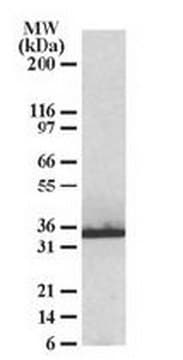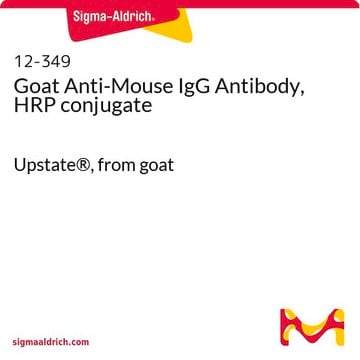S1073
Anti-STUB1/CHIP antibody, mouse monoclonal
clone ST21.55, purified from hybridoma cell culture
Synonym(s):
Anti-C terminus of HSC70-interacting protein (CHIP), Anti-HSPABP2, Anti-Heat shock protein A binding protein 2 (c-terminal), Anti-NY-CO-7, Anti-SDCCAG7, Anti-STIP1 homologous and box-containing protein 1 (STUB1), Anti-Serologically defined colon cancer antigen 7, Anti-UBOX1
About This Item
Recommended Products
biological source
mouse
conjugate
unconjugated
antibody form
purified from hybridoma cell culture
antibody product type
primary antibodies
clone
ST21.55, monoclonal
form
buffered aqueous solution
mol wt
antigen ~35 kDa
species reactivity
rat, human, bovine
concentration
~1.0 mg/mL
technique(s)
indirect ELISA: suitable
western blot: 2.5-5 μg/mL using HeLa total cell extract.
isotype
IgG2b
UniProt accession no.
shipped in
dry ice
storage temp.
−20°C
target post-translational modification
unmodified
Gene Information
bovine ... STUB1(504565)
human ... STUB1(10273)
mouse ... Stub1(56424)
rat ... Stub1(287155)
General description
Immunogen
Application
Biochem/physiol Actions
Physical form
Disclaimer
Not finding the right product?
Try our Product Selector Tool.
Storage Class Code
10 - Combustible liquids
WGK
WGK 1
Flash Point(F)
Not applicable
Flash Point(C)
Not applicable
Personal Protective Equipment
Certificates of Analysis (COA)
Search for Certificates of Analysis (COA) by entering the products Lot/Batch Number. Lot and Batch Numbers can be found on a product’s label following the words ‘Lot’ or ‘Batch’.
Already Own This Product?
Find documentation for the products that you have recently purchased in the Document Library.
Our team of scientists has experience in all areas of research including Life Science, Material Science, Chemical Synthesis, Chromatography, Analytical and many others.
Contact Technical Service








